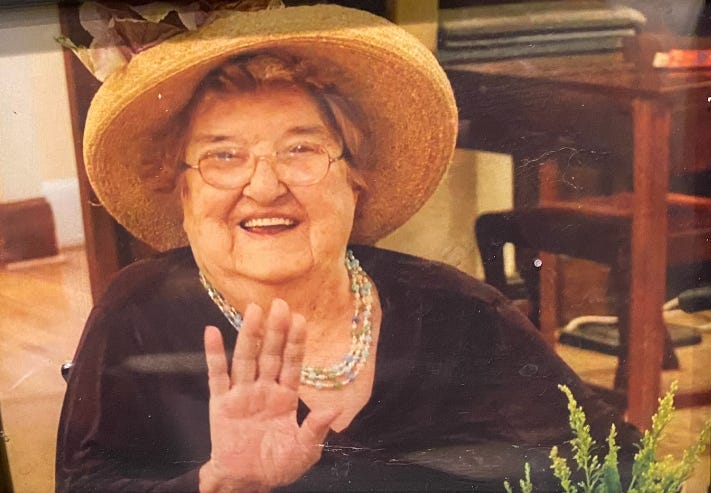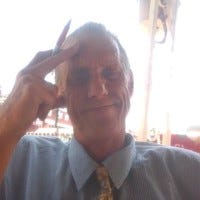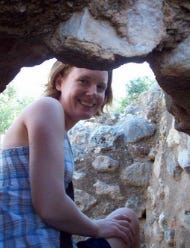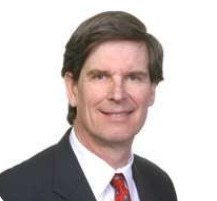On a Glorious Morning in Baltimore, I Can Still Hear Her Exclaiming: "Blessed Sunshine!"
Meet "Moose," My Truest Friend and the Greatest Hero I Have Ever Known, A Mother Her First of 11 Grandchildren Aptly Describes As a "Woman of Steel."
I swear, on gorgeous mornings like this, I see her eyes everywhere I look, and I hear her exclaiming in that Marlboro 100-worn, gravelly Lucille Ball voice once again: “Blessed sunshine!”
She had been the best and truest friend I will ever know — my mother, "Moose," and I miss her more than words could possibly convey
Even now, I again shed torrents of some mornings, as I remember her, but also laugh anew (“Blessed are those who weep now, for they will laugh”), as I marvel anew at her inner strength and beauty, her boundless love, mercy and compassion, her ability to teach us that, yes, we have met Love, God, and she is right in front of us
I recall her chiding me: "You act like you don't have all God gave you. You could drive Christ crazy!" (Not to mention myself, and others, Mom.)
I marvel anew at her inner strength and beauty, her boundless love, mercy and compassion, her ability to teach us that, yes, we have met Love, God, and she is right in front of us.
I can still see Moose as she laughs her gravelly, Lucille Ball laugh, exclaiming “Blessed sunshine!” while sipping her coffee (“aahhh”), dragging on a Marlboro 100 and performing her own little miracle of the loaves and fishes, somehow stretching a pound of jumbo lump crab meat to feed a dozen of us — her five children, spouses, grandchildren — thin crab cakes fried in oil.
Margaret Elizabeth Donohue Gately — a child of the Depression who lived most of the first 12 years of her life with her mother and three brothers in a 12-foot-wide alley house in East Baltimore — earned the nickname “Moose” after remarking decades ago, “I’m tough and hearty, hearty like a moose.” I don't know if I ever recall Mom happier than when she wore white sweatshirt adorned with the words"Merry ChristMoose!" in red and green on Christmas morning when all her children and grandchildren and in-laws came to her house to celebrate.
Moose was tough, indeed.
She died at age 97, family matriarch, mother and hero to five children and 11 grandchildren. Moose’s first grandchild, Maeve Donohue Gately, the daughter of her first son, Mark Donohue Gately, aptly describes her grandmother as a “woman of steel”— one who overcame enormous challenges that would have crushed others lacking her faith, her hope, her fortitude, her love. She taught me, and all of us, to search for light, even when things seem darkest, to find reasons to hope, reasons to believe even — no, especially -- when hope and reasons to believe seem most elusive.
“When I really think about what made me a strong woman, a woman who expects, who demands fair treatment and her place in the world, a big part of that identity must come from my grandmother." — Maeve Donahue Gately, the first of Mom’s 11 grandchildren
Moose lived the timeless wisdom of Winston Churchill:
“If you find yourself in hell, keep walking.”
Again and again, she showed us the meaning of those words, for she had been well-acquainted with tears, loss, grief and heartbreak since her very beginnings.
One night when Mom was 3 years old, her father, John Donohue, who like many an Irishman of his time liked drinking too much, left behind his pregnant wife and three young children living in that cramped house in East Baltimore and headed for New York.
Mom didn’t see her father for two years, until one sunny afternoon he surprised and delighted her when he showed up, kissed her, tousled her hair, smiled — and walked off.
She never saw him alive again.
They found his body floating in New York Harbor five years later.
Mom’s mother, Mary Weisner Donohue, cobbled together enough money to pay to have her husband’s body shipped home and for a proper Catholic funeral and burial.
Moose’s mother and hero taught her some of the lessons in life that matter most, and ones Mom never forgot or failed to live, one of them being how to keep walking — and how to keep the faith and hope in your heart and soul — when you find yourself in your own personal hell.
Desperate, with four young children to support, Mary Weisner Donohue took the trolley one morning and went into every building with lights on that she could get into and pleaded for a job. She stopped at the Daily Record newspaper building, which needed somebody to clean the office. “A man there told her, ‘Lady you’re too classy and well-dressed and well-spoken for this,’” Moose recalled. “But Mom said, ‘I have four children at home. I’ll take it.’”
She took on two other office-cleaning jobs and earned enough to pay tuition for her four children to attend Catholic primary schools.
Moose’s mother taught her another lesson she never forgot and never failed to live: Look upon even those who sinned most greatly against you with the eyes of love, compassion, mercy, forgiveness, the eyes of Christ.
“My mother,” Mom told near the end of her life, “would never say a bad word about my father. She just said, ‘You father was a good man who had a problem with the bottle.’”
Two years after burying her husband, Mary Weisner married Michael Norr, a teetotaler printer whose worst vice was chocolate, when Moose was 12. Michael, his bride, my mother and her three brothers found a little bit of heaven here on Earth when they moved from that tiny house in an industrial section of East Baltimore six miles — and a universe removed — to any airy house with a big backyard and covered front porch at 4211 LaSalle Avenue in Gardenville.
That move may help explain her devotion to and faith in Saint Anthony and her favorite prayer: “Saint Anthony, find a way” — for she and her family worshiped at the church just two blocks from her Moose’s new home, Saint Anthony of Padua Church, then the the biggest parish in the Archdiocese of Baltimore.
Mom married my father, Bernard Patrick Gately Jr. at St. Anthony’s in 1949 and she gave birth to five children in a span of 13 years.
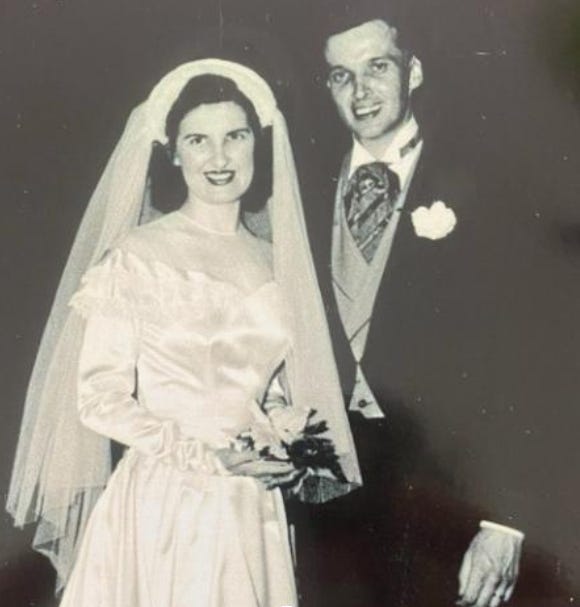
“Saint Anthony, find a way.” — Mom’s favorite prayer
Dad, a proud graduate of Mount Saint Joseph High School whose grandfather arrived in Baltimore from County Roscommon and settled in the West Baltimore community of Irvington, went on to become a star car salesman then manager of dealerships, and his sales team broke every sales record in the history of one dealership, Brooks Buick, in the Baltimore suburb of Towson. He could work a party or a showroom with equal panache and polish, convincing everyone he spoke to that nothing else in the world mattered at that moment but what they were saying. I perhaps inherited some of his tendencies to express inappropriate delight in espousing contrarian views. His Irish kin, among others, would try to fathom the unthinkable: how my father, an Irish Catholic, could publicly proclaim this new president, Jack Kennedy, greatly overrated.
Dad managed to find the absolute best lot in the new suburb of Chadwick Manor, carved out of farms in Baltimore County, Maryland, where he moved with Mom, me, my three brothers and my sister when I was an infant.
Dairy cows lumbered lazily on the other side of the barbed-wire fence of the dairy farm bordering our back yard. My father apparently didn't get the boundaries thing (like father, like son), though three of our neighbors believed in Frost's wisdom that good fences make good neighbors. But the way that God in His wisdom positioned one of these chain-link fences, green chain-link, you would have to have at least passing familiarity with Wiffle Ball to fully appreciate. For the Shettles' fence extended at the perfect angle at the perfect depth for a home run fence, stretching from its shortest distance from home plate, in left, to its greatest, in center.
When I look back on our ritual of playing Wiffle Ball, me and Eddie Wasceweicz facing off against my little brother, David, and David Dwyer, I realize that those glorious replays of this childhood, when you can tune in with the antenna just so to take you back there again, these, so suffused with light and love and hope and possibilities stretching as far as the horizon, can transport me to a place and time that I instantly realize I should and must visit more often.
But more than four decades after Dad left this Earth, I will always remember him best at Christmastime, hunched over the wires of the train garden in our living room, sparks flying while he hooks up the transformer so we can make the trains go fast and slow and belch steam while lumbering over and through the mountains and past the U.S. Post Office and the Texaco station and the church and the tiny houses and the felt green grass. Lights shine in the windows of the houses and along the trolley line and inside the passenger cars of the trains. My father’s ever-present Winston glows and his opalescent blue eyes twinkle, at least in part due to the consumption of significant quantities of National Bohemian. This is back in the 1960s, when the Hoffbergers of Baltimore brewed the beer, and Jerry Hoffberger owned the Orioles and would during by far the most successful years in the team’s history — and he had “10-cent beer nights” at the old Memorial Stadium.
Then, early on Christmas morning, my three brothers, my sister and I would parade down the steps of our house, somebody cradling the baby Jesus in a blanket for the trip to the stable under the tree, others holding lit candles. I suspect the Jesus Parade goes back to at least my father’s childhood home in Irvington, but nobody’s sure. Whatever its origins, I never saw the old man more content than during our annual family ritual. He would film it all with a movie camera that had two blinding spotlights, and just seeing those lights made you believe in miracles. What else could explain all those stars dancing in your eyes, along with colored Christmas tree lights reflecting off the gaudy silver garland laid on heavy and the glistening bows and wrapping paper on five neat piles of gifts?
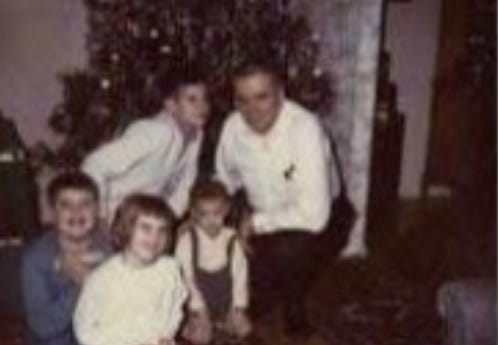
Always, on Christmas morning, we found piles of gifts stacked at least a few feet deep: electric football, a talking football, a fire helmet with a built-in microphone, Sizzler racing sets with loop-to-loops, a fire truck you could drive, the first crude toy machine that pitched plastic balls so you could bat them, a catcher’s mitt, a baseball pitch-back, hockey sticks and pucks and skates. One year my mother, Margaret Donohue Gately, got a new yellow Buick convertible with a black leather interior as a Christmas gift. One Christmas, Dad surprised Mom with a yellow Buick convertible wrapped in a big red ribbon outside our house.
But for Mom, for me, for my three brothers and my sister, Dad’s Irish tendency to drink to excess would slowly, but inevitably, it seems in retrospect, exact a heavy toll on his family.
As I got older, I loved Christmastime for all it was and for all it wasn’t. At Christmastime, I felt like we were a real family, even though my parents no longer slept in the same room by the time I was 5. I savored every moment of that feeling in part because it could be so elusive the rest of the year. Christmastime meant none of the screaming matches between my mother and father that came more and more as his drunken rages worsened when he began suffering the slow drowning alive that is emphysema and went bankrupt. Christmas morning pushes out of my mind being forced to kneel on hardwood floors and whipped with belts as punishment.
In the years after Mom began sleeping upstairs, my little brother and I slept in a twin bed next to my father in the first-floor master bedroom, and every night he prayed with us. For the duration of our prayers, he would take a break from the Winstons, but still he could cough a half-hour straight after years of chain-smoking in a business where smoking and drinking were as endemic as on “Mad Men.” It was always the same. We began, “Now I lay me down to sleep….” before asking God’s blessings for our family and others and asking Jesus to take pity on and strength to the less-fortunate — the poor and the starving, the homeless, the sick, those suffering the ravages of war, the poor souls in Purgatory.
When we prayed with my father, he would tell us that God listens especially closely to the prayers of young children and he’d ask us to please pray hard for him because he was in the doghouse. This usually meant too many bills and no work. Even then, I knew was suffering an earthly Purgatory long before his death. It got so bad at one point that he was driving a cab — my mother worried somebody would shoot him in those scary days after the riots — and instead of coming home in a new Buick or Pontiac, he pulled up to the house in a beat-up black Chevy. It’s one of the many times I recall him uttering one of his favorite prayers, by turns, an act of faith, or a plaintive plea that began: “With the help of the Lord…”
When we buried him on a gray April day at New Cathedral Cemetery, I felt like I hardly knew the father my older brothers and my mother had known. By the time he died at 59, he and my mother had been divorced for about five years. In those last years, he’d show up on Christmas at our tiny townhouse where my mother shared one bedroom with my sister and my little brother and I shared the other. Nobody ever suggested continuing the Jesus Parade at 6 Balset Court — it could never be the same. Already by then, my father had become the ghost of Christmas past, the twinkle in his eyes replaced by a sad gaze looking out from a face hollow and gaunt.
“It just seems almost impossible. How can you do this? She hadn’t worked since I was born in 1952. It had to be very tough to go back to work after raising five children with the youngest two at 8 and 10. I do think back on it, and all I can think is, ‘How did she do what she managed to do?’ If she had been born a generation later, she would have been a CEO.”— Mark Donohue Gately Mom’s first-born son, Mark Donohue Gatel
After her marriage disintegrated, Mom —surely uttering her favorite prayer, “St. Anthony, find a way” — returned to work after two decades or raising children as a typist at Social Security Administration headquarters in Woodlawn and for a time relied on food stamps to feed her children.
My brother Mark, a retired attorney who had been widely regarded as one of the best litigators in the country, still marvels at Mom’s ability to once again apply Winston Churchill’s wisdom that if you find yourself in hell, you must indeed keep walking to find light amid darkness, faith amid doubt and sometimes to start all over again, demonstrating once again.
For Mom, now destitute, left with no choice but to return to work after raising kids for 20 years, started at the bottom in her government job, attended community college, then the University of Maryland on Uncle Sam’s dime (a perk of her new government job), finishing just shy of a bachelor’s degree in business, prevailed in an federal age-discrimination complaint against the government and retired as an executive at one of the highest-ranked grade levels in the federal government.
“It just seemed impossible,” Mark says, looking back. “How can you do this? She hadn’t worked since I was born in 1952. It had to be very tough to go back to work after raising five children with the youngest two at 8 and 10. I do think back on it, and all I can think is, ‘How did she do what she managed to do?’
"If she had been born a generation later,” my brother and on-again-off -again surrogate father of four decades adds, “she would have been a CEO."
Mark’s daughter Maeve says: “When I really think about what made me a strong woman, a woman who expects, who demands fair treatment and her place in the world, a big part of that identity must come from my grandmother."
Words could never convey how much you, Moose, my truest friend, and you will always be my greatest hero.
As Mother’s Day slipped into night, then night slipped into day, the tears finally gave way to laughter, and I swear I felt Moose right there in front of me again as I sat alone in my basement apartment.
She had her unique way of sometimes not so gently coaxing me, with words, however indelicate they may seem, filled with wisdom and love.
It takes me all the way to the sweltering Summer of 1985 to my first desperate weeks of that 14-month, euphemistically rate weeks of that 14-month, euphemistically named "Reporter-Trainee Program" internship at The New York Times, deep in the night in one of the many nights when the skinny, terrified kid with bad teeth would close the glass doors of the wooden phone booth in the basement of Ruggles Hall at Columbia University, which let lower-income interns live free during the summer months, and I'm sobbing uncontrollably, and Moose says this, written in the reporter's notepad before me now: “Oh, for Christ’s sake, stop your sobbing and moaning — put that in one hand, piss in the other and see which one fills up first — and just start writing the goddamn thing, just a sentence. That’s the hardest part, and then you’ll be able to stop going on like a hoodle.” (Hoodle, in old Baltimore parlance, is used to describe one who’s not all there in the head, or as Moose might remind me when I did so: “You act like you don’t have all God Gave you! You could drive Christ crazy!”)
On the phone that long-ago night, she managed from 200 miles away to once more hug my tears away.
But inevitably, I call sobbing again from the wooden phone booth in the basement of Ruggles Hall just a few nights later:
It’s so dirty in New York and so loud, Moose, sirens going nonstop, and there’s always track fires on the Broadway Local subway tracks, the air-conditioning on the No. 1 line subway cars covered in graffiti never worked so hot winds whip through them, and by the time I arrive at the Times newsroom on West 43rd Street look as if I’ve been drinking all night. And everybody else is so smart, these Ivy Leaguers with perfect hair and perfect teeth and perfect bodies. And I’m this skinny University of Maryland grad with bad teeth, I know I’ll never make it here and I never should have accepted this internship, Moose. I should have taken the offers for actual jobs at the Detroit or Raleigh papers or the AP. I’ll never make it here, Moose.
I’m testing her patience. I can tell when she snaps:
“I don't wanna hear this horseshit about how they're all rich and Ivy League and how and they're smarter than you and you'll never make it there. Always remember this: Don’t ever think you're better than anybody else, but don't ever think anybody’s better than you either."
I’ll try to remember, Moose but sometimes I forget, and I’m lost in all that Catholic guilt and self-loathing and self-flagellating.
I know, I plead guilty, Moose.
“You could drive Christ crazy!”
If you spot any errors, want to share news tips, pitch story ideas or submit a first-person piece, please get in touch. I’d love to hear from you. Thanks again for reading. — Gary Gately, Editor, The Baltimore Observer, garymichaelgately@gmail.com, 410-382-4364.



